英语专业综合教程4 unit3课文翻译
- 格式:doc
- 大小:37.50 KB
- 文档页数:4
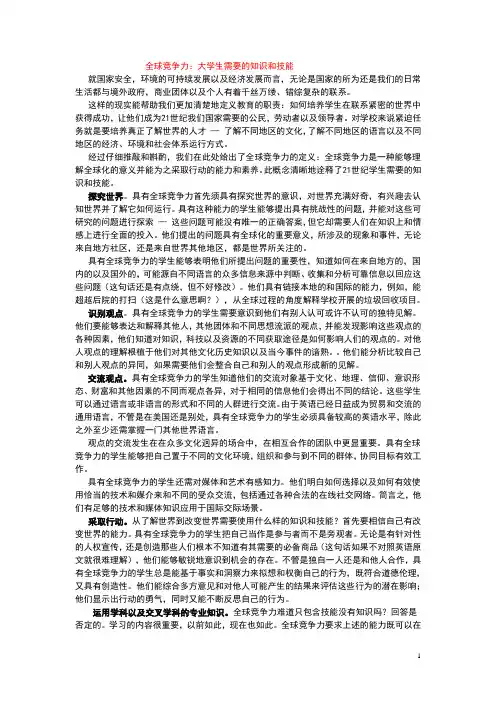
全球竞争力:大学生需要的知识和技能就国家安全,环境的可持续发展以及经济发展而言,无论是国家的所为还是我们的日常生活都与境外政府,商业团体以及个人有着千丝万缕、错综复杂的联系。
这样的现实能帮助我们更加清楚地定义教育的职责:如何培养学生在联系紧密的世界中获得成功,让他们成为21世纪我们国家需要的公民,劳动者以及领导者。
对学校来说紧迫任务就是要培养真正了解世界的人才—了解不同地区的文化,了解不同地区的语言以及不同地区的经济、环境和社会体系运行方式。
经过仔细推敲和斟酌,我们在此处给出了全球竞争力的定义:全球竞争力是一种能够理解全球化的意义并能为之采取行动的能力和素养。
此概念清晰地诠释了21世纪学生需要的知识和技能。
探究世界。
具有全球竞争力首先须具有探究世界的意识,对世界充满好奇,有兴趣去认知世界并了解它如何运行。
具有这种能力的学生能够提出具有挑战性的问题,并能对这些可研究的问题进行探索—这些问题可能没有唯一的正确答案,但它却需要人们在知识上和情感上进行全面的投入。
他们提出的问题具有全球化的重要意义,所涉及的现象和事件,无论来自地方社区,还是来自世界其他地区,都是世界所关注的。
具有全球竞争力的学生能够表明他们所提出问题的重要性,知道如何在来自地方的,国内的以及国外的,可能源自不同语言的众多信息来源中判断、收集和分析可靠信息以回应这些问题(这句话还是有点绕,但不好修改)。
他们具有链接本地的和国际的能力,例如,能超越后院的打扫(这是什么意思啊?),从全球过程的角度解释学校开展的垃圾回收项目。
识别观点。
具有全球竞争力的学生需要意识到他们有别人认可或许不认可的独特见解。
他们要能够表达和解释其他人,其他团体和不同思想流派的观点,并能发现影响这些观点的各种因素,他们知道对知识,科技以及资源的不同获取途径是如何影响人们的观点的。
对他人观点的理解根植于他们对其他文化历史知识以及当今事件的谙熟。
他们能分析比较自己和别人观点的异同,如果需要他们会整合自己和别人的观点形成新的见解。

1 I run a manufacturing company with about 350 employees, and I often do the interviewing and hiring myself. I like talking to potential salespeople, because they're our link to customers.得到你想要的工作哈维·B·麦凯我经营着一家有350名左右员工的制造公司,我本人常常要对求职者进行面试,决定是否聘用。
我喜欢与可能成为营业员的人交谈,因为他们会是我们与顾客联系的纽带。
2 When a recent college graduate came into my office not too long ago looking for a sales job, I asked him what he had done to prepare for the interview. He said he'd read something about us somewhere.不久前一个新近毕业的大学生到我办公室谋求一份销售工作。
我问他为这次面试做过哪些准备。
他说他在什么地方看到过有关本公司的一些情况。
3 Had he called anyone at Mackay Envelope Corporation to find out more about us? No. Had he called our suppliers? Our customers? No.他有没有给麦凯信封公司的人打过电话,好了解更多有关我们的情况?没打过。
他有没有给我们的供应厂商打过电话?还有我们的客户?都没有。
4 Had he checked with his university to see if there were any graduates working at Mackay whom he could interview? Had he asked any friends to grill him in a mock interview? Did he go to the library to find newspaper clippings on us?他可曾在就读的大学里查问过有没有校友在本公司就职,以便向他们了解一些情况?他可曾请朋友向他提问,对他进行模拟面试?可曾去图书馆查找过有关本公司的剪报?5 Did he write a letter beforehand to tell us about himself, what he was doing to prepare for the interview and why he'd be right for the job? Was he planning to follow up the interview with another letter indicating his eagerness to join us? Would the letter be in our hands within 24 hours of the meeting, possibly even hand-delivered? 他事先有没有写封信来介绍自己,告诉我们自己为这次面试在做哪些准备,自己何以能胜任此项工作?面试之后他是否打算再写一封信,表明自己加盟本公司的诚意?这封信会不会在面试后的24小时之内送到我们手上,也许甚至是亲自送来?6 The answer to every question was the same: no. That left me with only one other question: How well prepared would this person be if he were to call on a prospective customer for us? I already knew the answer.他对上述每一个问题的回答全都一样:没有。
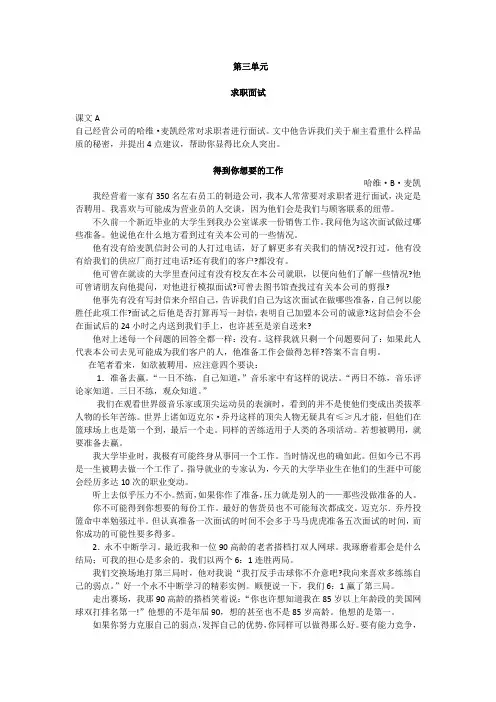
第三单元求职面试课文A自己经营公司的哈维·麦凯经常对求职者进行面试。
文中他告诉我们关于雇主看重什么样品质的秘密,并提出4点建议,帮助你显得比众人突出。
得到你想要的工作哈维·B·麦凯我经营着一家有350名左右员工的制造公司,我本人常常要对求职者进行面试,决定是否聘用。
我喜欢与可能成为营业员的人交谈,因为他们会是我们与顾客联系的纽带。
不久前一个新近毕业的大学生到我办公室谋求一份销售工作。
我问他为这次面试做过哪些准备。
他说他在什么地方看到过有关本公司的一些情况。
他有没有给麦凯信封公司的人打过电话,好了解更多有关我们的情况?没打过。
他有没有给我们的供应厂商打过电话?还有我们的客户?都没有。
他可曾在就读的大学里查问过有没有校友在本公司就职,以便向他们了解一些情况?他可曾请朋友向他提问,对他进行模拟面试?可曾去图书馆查找过有关本公司的剪报?他事先有没有写封信来介绍自己,告诉我们自己为这次面试在做哪些准备,自己何以能胜任此项工作?面试之后他是否打算再写一封信,表明自己加盟本公司的诚意?这封信会不会在面试后的24小时之内送到我们手上,也许甚至是亲自送来?他对上述每一个问题的回答全都一样:没有。
这样我就只剩一个问题要问了:如果此人代表本公司去见可能成为我们客户的人,他准备工作会做得怎样?答案不言自明。
在笔者看来,如欲被聘用,应注意四个要诀:1.准备去赢。
“一日不练,自己知道,”音乐家中有这样的说法。
“两日不练,音乐评论家知道。
三日不练,观众知道。
”我们在观看世界级音乐家或顶尖运动员的表演时,看到的并不是使他们变成出类拔萃人物的长年苦练。
世界上诸如迈克尔·乔丹这样的顶尖人物无疑具有≤≥凡才能,但他们在篮球场上也是第一个到,最后一个走。
同样的苦练适用于人类的各项活动。
若想被聘用,就要准备去赢。
我大学毕业时,我极有可能终身从事同一个工作。
当时情况也的确如此。
但如今已不再是一生被聘去做一个工作了。
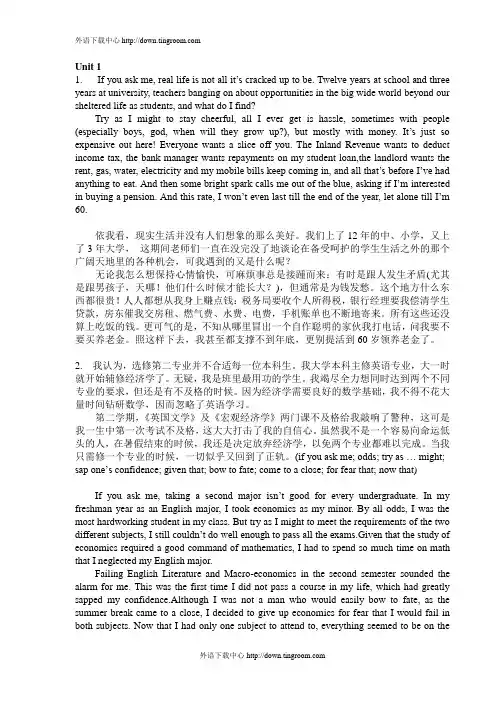
Unit 11. If you ask me, real life is not all it’s cracked up to be. Twelve years at school and three years at university, teachers banging on about opportunities in the big wide world beyond our sheltered life as students, and what do I find?Try as I might to stay cheerful, all I ever get is hassle, sometimes with people (especially boys, god, when will they grow up?), but mostly with money. It’s just so expensive out here! Everyone wants a slice off you. The Inland Revenue wants to deduct income tax, the bank manager wants repayments on my student loan,the landlord wants the rent, gas, water, electricity and my mobile bills keep coming in, and all that’s before I’ve had anything to eat. And then some bright spark calls me out of the blue, asking if I’m interested in buying a pension. And this rate, I won’t even last till the end of the year, let alone till I’m 60.依我看,现实生活并没有人们想象的那么美好。

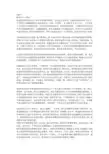
Unit 3版权的十大神话1)如果没有版权标识,就不会受到版权保护。
这在过去是事实,但现在情况就有所不同了,几乎所有大国邮遵循伯尔尼版权协定,比如,在美国,自1989年4月1日后,几乎所有个人创作以及原创的作品,不管它是否有版权标识,都受到版权保护。
大家默认的是他人的作品已受到版权保护,不能随意复制,除非你能确信它不受版权保护:有些年代久远的作品如果没有标识,就不受到版权保护,但坦白地说如果这一点不能肯定,你就不应冒这个风险。
2)如果我没有为此收费,就不算侵权。
错。
你是否收费可能对法庭上判罚金的额度有所影响,但那只是在这一法律条文下量刑的主要区别。
即使你免费分发他人的作品,仍然是侵权。
而且如果危及到他人财产的商业价值,仍然会被罚以大额赔偿金。
个人的音乐拷贝是唯一的例外,不被列入侵权行为。
不过法庭上似乎有这种说法,个人拷贝不包括像纳帕斯特那样的大规模匿名复制行为。
如果该作品没有向业价值,侵权多是技术性的,不会受到起诉。
3)如果已被发送到世界性的新闻组网络系统(Usenet)的材料,那就不受版权限制。
错。
现代社会里任何东西都要受到版权限制,除非所有者明确表示它不受版权限制。
要确定它是否受到版权限制,必须得要作者/所有者的书面证明:“我准予某某不受版权限制。
”4)我的帖子只是合理使用。
“合理使用”可以免除版权限制,它的设立使人们可以使用某些作品,而不必经过作者的同意,这些作品包括解说词、模仿诗文、新闻报道以及那些对受版权保护的著作的研究和宣传的作品。
这一规定非常重要,有了这一规定版权法就不会成为妨碍你自由地发表作品的绊脚石。
但涉及到故意侵权和损害具有商业价值的作品时就要慎重考虑了。
你做过这样的事吗?由于你自己没有时间写文章,或是为了让你的读者免受给《纽约时报》网站缴费之累,于是就从《纽约时报》上复制一篇。
这种行为不是“合理使用”。
合理使用通常只是一条简短的摘录。
5)如果你不保护好你的版权你就会失去它——有人就可以取得那个名字的版权。

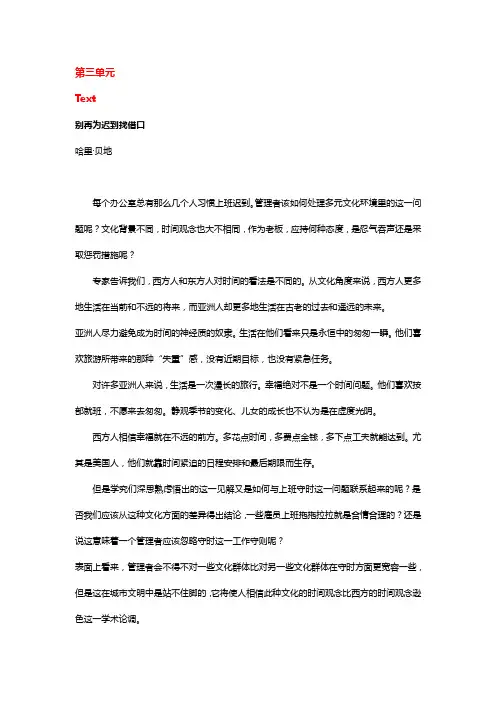
第三单元Text别再为迟到找借口哈里·贝地每个办公室总有那么几个人习惯上班迟到。
管理者该如何处理多元文化环境里的这一问题呢?文化背景不同,时间观念也大不相同,作为老板,应持何种态度,是忍气吞声还是采取惩罚措施呢?专家告诉我们,西方人和东方人对时间的看法是不同的。
从文化角度来说,西方人更多地生活在当前和不远的将来,而亚洲人却更多地生活在古老的过去和遥远的未来。
亚洲人尽力避免成为时间的神经质的奴隶。
生活在他们看来只是永恒中的匆匆一瞬。
他们喜欢旅游所带来的那种“失重”感,没有近期目标,也没有紧急任务。
对许多亚洲人来说,生活是一次漫长的旅行。
幸福绝对不是一个时间问题。
他们喜欢按部就班,不愿来去匆匆。
静观季节的变化、儿女的成长也不认为是在虚度光阴。
西方人相信幸福就在不远的前方。
多花点时间,多费点金钱,多下点工夫就能达到。
尤其是美国人,他们就靠时间紧迫的日程安排和最后期限而生存。
但是学究们深思熟虑悟出的这一见解又是如何与上班守时这一问题联系起来的呢?是否我们应该从这种文化方面的差异得出结论,一些雇员上班拖拖拉拉就是合情合理的?还是说这意味着一个管理者应该忽略守时这一工作守则呢?表面上看来,管理者会不得不对一些文化群体比对另一些文化群体在守时方面更宽容一些,但是这在城市文明中是站不住脚的,它将使人相信此种文化的时间观念比西方的时间观念逊色这一学术论调。
这便混淆了两种截然不同的事情:遵守时间和对时间的哲学观。
一个人认为时间是以百年来度量的,并非以秒来计算,这与他每天能够按时到办公室上班并无关系。
没有哪一个亚洲雇员会为自己的迟到找一个文化背景方面的借口。
他可能会寻找一些更现代化的借口,如交通堵塞、表慢了以及停车麻烦等。
这些措辞与西方办公室人员所用的藉口并无区别。
为什么在亚洲经常以这些借口迟到可以被接受,而在西方这样一个人却被认为是不可依靠、不可信赖的呢?问题可能是,在我们亚洲人的社会生活中,对于那些让我们在市区约会的地点等候半小时的亲友们,我们往往比较宽容。
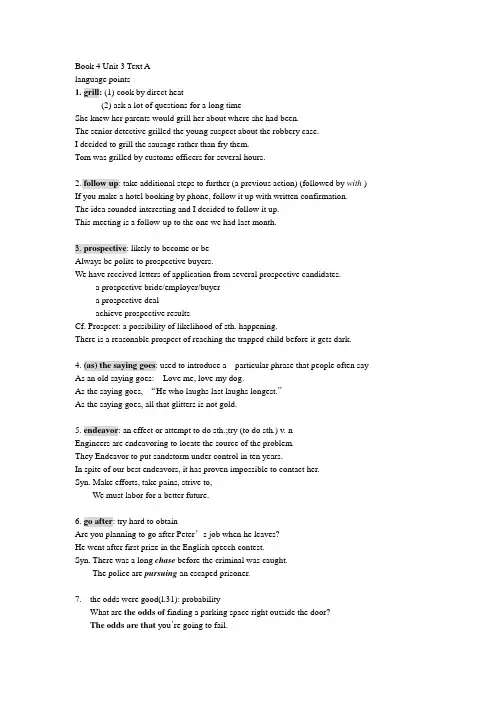
Book 4 Unit 3 Text Alanguage points1. grill: (1) cook by direct heat(2) ask a lot of questions for a long timeShe knew her parents would grill her about where she had been.The senior detective grilled the young suspect about the robbery case.I decided to grill the sausage rather than fry them.Tom was grilled by customs officers for several hours.2. follow up: take additional steps to further (a previous action) (followed by with ) If you make a hotel booking by phone, follow it up with written confirmation.The idea sounded interesting and I decided to follow it up.This meeting is a follow-up to the one we had last month.3. prospective: likely to become or beAlways be polite to prospective buyers.We have received letters of application from several prospective candidates.--a prospective bride/employer/buyer--a prospective deal--achieve prospective resultsCf. Prospect: a possibility of likelihood of sth. happening.There is a reasonable prospect of reaching the trapped child before it gets dark.4. (as) the saying goes: used to introduce a particular phrase that people often say As an old saying goes: Love me, love my dog.As the saying goes, “He who laughs last laughs longest.”As the saying goes, all that glitters is not gold.5. endeavor: an effect or attempt to do sth.;try (to do sth.) v. nEngineers are endeavoring to locate the source of the problem.They Endeavor to put sandstorm under control in ten years.In spite of our best endeavors, it has proven impossible to contact her.Syn. Make efforts, take pains, strive to,We must labor for a better future.6. go after: try hard to obtainAre you planning to go after Peter’s job when he leaves?He went after first prize in the English speech contest.Syn. There was a long chase before the criminal was caught.The police are pursuing an escaped prisoner.7.the odds were good(l.31): probabilityWhat are the odds of finding a parking space right outside the door?The odds are that you’re going to fail.8.prospects (l.41)--The prospects for peace in the country’s civil war are becoming brighter.(possibility)--There is a real prospect that the bill will be defeated in parliament.--I choose to work abroad to improve my career prospects. (chance of success)--have bad job prospects9. incidentally: by the way, by chanceIn our discussion this question was incidentally brought up.And, incidentally, it is not uncommon for wives to complain that their husbands do not notice new dresses, new hats, and changes in household arrangements. .Cf. by accident/ by chanceErrors are inescapable incidents in the course of scientific research.His debut at Carnegie Hall was the first of a succession of exciting incidents in his life10. chuckle: laugh quietly (funny, enjoy yourself)The professor chuckled when we told her that we were afraid of her.The father chuckled approval of what the son did.11.be inadequate(l.60)--inadequate staffing: under-staffing--The projects are inadequately funded.--feel inadequate--He is inadequate for the job.12.miracle of miracles(l.61)--work/achieve/create miracles--It’s a miracle that he was not killed.by a miracle--His life was saved by a miraclemiraculous adj.--miraculous recovery/accuracy--It is miraculous that …13. take/have a crack (at): try to do (sth.)e.g.: They have decided to have a crack at the doubles championship.I would like to take a crack at the Olympic title again before I retire.14.accomplish goals(l.72)--accomplish a mission/task--accomplish one’s purpose--hardly accomplish anythingaccomplished adj.--an accomplished girl/scholar15. Make a difference: change the situation or outlook; have an effectHaving a good teacher has made all the difference for Alex.Where you live can make such a difference to the way you feel.16.sport(l.78): wear sth without shyness orstylishly or to show off--She came in sporting a fur coat.--Many artists tend to sport long hair and strange clothes.17. blurt: utter abruptly and thoughtlesslyFolks that blurt out just what they think wouldn't be so bad if they thought.As soon as the teacher put forward the question, he blurted the answer out.他一气之下冲口说出了那个秘密。
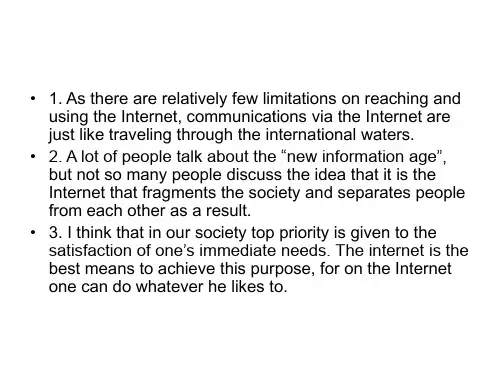
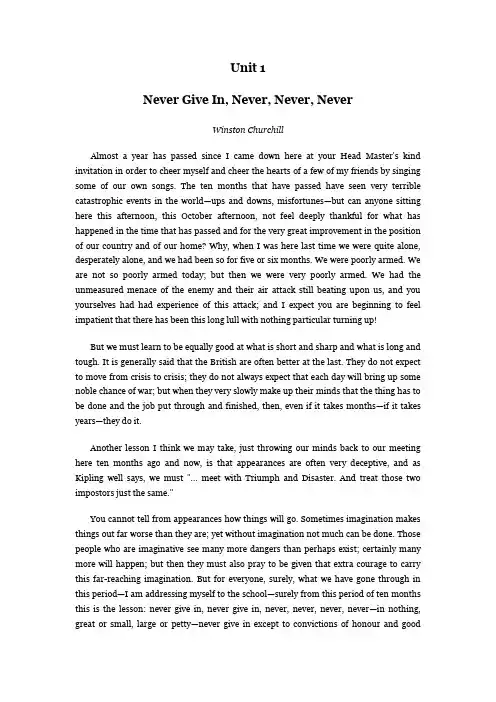
Unit 1Never Give In, Never, Never, NeverWinston ChurchillAlmost a year has passed since I came down here at your Head Master's kind invitation in order to cheer myself and cheer the hearts of a few of my friends by singing some of our own songs. The ten months that have passed have seen very terrible catastrophic events in the world—ups and downs, misfortunes—but can anyone sitting here this afternoon, this October afternoon, not feel deeply thankful for what has happened in the time that has passed and for the very great improvement in the position of our country and of our home? Why, when I was here last time we were quite alone, desperately alone, and we had been so for five or six months. We were poorly armed. We are not so poorly armed today; but then we were very poorly armed. We had the unmeasured menace of the enemy and their air attack still beating upon us, and you yourselves had had experience of this attack; and I expect you are beginning to feel impatient that there has been this long lull with nothing particular turning up!But we must learn to be equally good at what is short and sharp and what is long and tough. It is generally said that the British are often better at the last. They do not expect to move from crisis to crisis; they do not always expect that each day will bring up some noble chance of war; but when they very slowly make up their minds that the thing has to be done and the job put through and finished, then, even if it takes months—if it takes years—they do it.Another lesson I think we may take, just throwing our minds back to our meeting here ten months ago and now, is that appearances are often very deceptive, and as Kipling well says, we must "... meet with Triumph and Disaster. And treat those two impostors just the same."You cannot tell from appearances how things will go. Sometimes imagination makes things out far worse than they are; yet without imagination not much can be done. Those people who are imaginative see many more dangers than perhaps exist; certainly many more will happen; but then they must also pray to be given that extra courage to carry this far-reaching imagination. But for everyone, surely, what we have gone through in this period—I am addressing myself to the school—surely from this period of ten months this is the lesson: never give in, never give in, never, never, never, never—in nothing, great or small, large or petty—never give in except to convictions of honour and goodsense. Never yield to force; never yield to the apparently overwhelming might of the enemy. We stood all alone a year ago, and to many countries it seemed that our account was closed, we were finished. All this tradition of ours, our songs, our school history, this part of the history of this country, were gone and finished and liquidated.Very different is the mood today. Britain, other nations thought, had drawn a sponge across her slate. But instead our country stood in the gap. There was no flinching and no thought of giving in; and by what seemed almost a miracle to those outside these islands, though we ourselves never doubted it, we now find ourselves in a position where I say that we can be sure that we have only to persevere to conquer.You sang here a verse of a school song: you sang that extra verse written in my honour, which I was very greatly complimented by and which you have repeated today. But there is one word in it I want to alter—I wanted to do so last year, but I did not venture to. It is the line: "Not less we praise in darker days."I have obtained the Head Master's permission to alter darker to sterner. "Not less we praise in sterner days."Do not let us speak of darker days: let us speak rather of sterner days. These are not dark days; these are great days—the greatest days our country has ever lived; and we must all thank God that we have been allowed, each of us according to our stations, to play a part in making these days memorable in the history of our race.绝不屈服,绝不,绝不,绝不温斯顿·丘吉尔1 将近一年前,应贵校校长盛情邀请,我来到这里唱了几首我们自己的歌曲,既为自己加油,也为一些朋友打气。
三、全文翻译Text A知识彩虹克雷格·拉塞尔1我这辈子四分之三以上的时间(50年中有39年)是在纽约的中小学或大学里度过的,不是在上学,就是在教学。
2于是,你或许会认为,经过这么长一段时间,我应该了解一些情况,确实知道一些东西,对知识和对生活该会积极地予以把握和肯定了。
可是,我却没有做到这一点。
事实上,我知道的东西越多,反倒越觉得自己无知。
3当然,说自己知道的东西越多,反倒越觉得自己无知,这种说法是矛盾的。
然而,现代物理学告诉我们,现实世界本身就是矛盾的。
科学家们对物质现实世界研究得越多,就越无法对它进行把握。
在某种意义上,他们了解的越多,知道的就越少。
4知识本身就是矛盾的。
打个比方,假设你的知识是一个点,就像这个句子末尾的句号一样。
请注意这个句号微小的圆周,假设它代表我们已知和未知的分界——换句话说,就是你对自己不知道的东西的认知。
5但现在想象一下那个小小的句号在渐渐扩大,它的黑色部分占据页面越来越多的地方。
随着它的扩大,它的周缘也跟着扩大。
如果那个正在增大的黑色部分代表你的知识的话,在知识增长的同时,你会意识到自己有许多不知道的东西。
也就是说,你知道的越多,就越觉得自己无知。
6你在求知过程中肯定有过类似的经历。
起初,你甚至并不知道还有某个学科的存在。
当然,这个学科是早就存在的,只是你以前没有注意到而已。
1988年有了第一台电脑以后,我去杂志店,想找一些关于电脑操作方面的书,结果发现这类书琳琅满目,让我吃惊。
同样,当我有幸获得讲授电影分析这门课的机会时,我发现有关这个领域的专著也多得令我眼花缭乱。
7假设你决定研究这一课题。
你买了一本有关这一课题的书,一本你能找到的最好也是最全面的(或是你认为是这样的)书,或许你是从图书馆借来了这本书。
但你很快就会发现,阅读这本书只会给你带来更多的问题,而不是要解答你的疑问。
8譬如,今年早些时候,我非但不知道自己对技术和自由之间的关系有兴趣,甚至没有意识到这两者之间有可能存在着某种联系。
TEXT Ⅰ Alienation and the InternetWill BakerThe Internet provides an amazing forum for the free exchange of ideas. Given the relatively few restrictions governing access and usage, it is the communications modal equivalent of international waters. It is my personal belief that the human potential can only be realized by the globalization of ideas. I developed this position years before the Internet came into wide spread use. And I am excited at the potential for the Internet to dramatically alter our global society for the better. However I am also troubled by the possible unintended negative consequences.互联网提供了一个惊人的论坛,让思想的自由交流。
给出了相对较少的限制访问和使用管理,是国际水域的通讯模态等价。
这是我个人的信念,那就是人的潜力只能实现的全球化思想。
几年前我开发了这个职位的广泛应用,网络走进。
而且我高兴看到了因特网的潜力,是它戏剧性地改变了我们的国际社会,使其向更好。
然而,我也陷入了困境的可能的意想不到的负面后果。
There has been much talk about the "new information age." But much less widely reported has been the notion that the Internet may be responsible for furthering the fragmentation of society by alienating its individual users. At first this might sound like an apparent contradiction: how can something, that is on the one hand responsible for global unification by enabling the free exchange of ideas, alienate the participants?有很多人谈论“新信息时代。
新标准大学英语综合教程4教师用书unit3课文翻译Translation of the passagesActive reading (1)时装潮流50年1960 至2010 年间的时装史存在着两个不可忽略或不可低估的不变因素:一是无处不在的牛仔裤,二是女装裙摆的升降。
牛仔裤是用粗斜纹布做的,早在16 世纪末法国就有了这种布料。
直到19 世纪中叶,李维·施特劳斯发现在加州淘金热中劳动的矿工很需要用这种耐用布料做成的牛仔裤,他还用铆钉来加固裤子。
直到1950 年代,蓝色粗斜纹布做的牛仔裤一直只是流行的工装,但是后来牛仔裤变成了青春、新思想、反叛及个性的标志。
1950 年代末,李维·施特劳斯公司开始向欧亚出口蓝色牛仔裤。
年轻人趋之若鹜,视其为美国活力四射的、随意的生活方式的象征。
裙摆在这一时期有着特殊的意义。
人们时常会注意到,女人的裙摆和经济之间存在一种颇为精确的关联性,且鲜有例外。
股市升时裙摆也跟着上升;股市跌时裙摆就跟着下降。
在经济繁荣和萧条时期女性到底为什么要多暴露或少暴露双腿至今仍然是个迷。
但总的趋势是必定是这样的:每当经济前景不明朗时,男人和女人都倾向于穿比较保守的衣服。
1960 年代时装史上一个最重要的发展就是英国时装设计师玛丽·匡特发明的超短裙。
由于匡特在‚摇摆伦敦‛的中心地带工作,超短裙很快就风行全球。
当法国杰出的时装设计师库雷热把超短裙变成一件高级时装时,超短裙得到了人们更多的尊敬。
但是,如果只有长筒袜而没有发明裤袜的话,超短裙是不可能在全球流行的,因为裙摆的上升会让人看见长筒袜的袜口。
60 年代中、70 年代初的嬉皮士运动影响了牛仔裤的设计,牛仔裤的裤腿发展成了扩张的‚喇叭形‛。
到了70 年代中期,随着经济的恶化,裙摆降低到了小腿中部和脚踝部,而牛仔裤则不再是清一色的蓝色了。
牛仔裤在朋克时期依然很时髦,裤腿通常有撕裂的口子,并配有铁链及打着装饰钉的皮带。
3A1|知识彩虹| 克雷格·拉塞尔我这辈子四分之三以上的时间(50年中有39年)是在纽约的中小学或大学里度过的,不是在上学,就是在教学。
2于是,你或许会认为,经过这么长一段时间,我应该了解一些情况,确实知道一些东西,对知识和对生活该会积极地予以把握和肯定了。
可是,我却没有做到这一点。
事实上,我知道的东西越多,反倒越觉得自己无知。
3当然,说自己知道的东西越多,反倒越觉得自己无知,这种说法是矛盾的。
然而,现代物理学告诉我们,现实世界本身就是矛盾的。
科学家们对物质现实世界研究得越多,就越无法对它进行把握。
在某种意义上,他们了解的越多,知道的就越少。
4知识本身就是矛盾的。
打个比方,假设你的知识是一个点,就像这个句子末尾的句号一样。
请注意这个句号微小的圆周,假设它代表我们已知和未知的分界——换句话说,就是你对自己不知道的东西的认知。
5但现在想象一下那个小小的句号在渐渐扩大,它的黑色部分占据页面越来越多的地方。
随着它的扩大,它的周缘也跟着扩大。
如果那个正在增大的黑色部分代表你的知识的话,在知识增长的同时,你会意识到自己有许多不知道的东西。
也就是说,你知道的越多,就越觉得自己无知。
6你在求知过程中肯定有过类似的经历。
起初,你甚至并不知道还有某个学科的存在。
当然,这个学科是早就存在的,只是你以前没有注意到而已。
1988年有了第一台电脑以后,我去杂志店,想找一些关于电脑操作方面的书,结果发现这类书琳琅满目,让我吃惊。
同样,当我有幸获得讲授电影分析这门课的机会时,我发现有关这个领域的专著也多得令我眼花缭乱。
7假设你决定研究这一课题。
你买了一本有关这一课题的书,一本你能找到的最好也是最全面的(或是你认为是这样的)书,或许你是从图书馆借来了这本书。
Unit 3 网霸的出现与漫延1 瑞安·哈利根几个月来一直受同学嘲弄。
他们通过即时信息散布谣言,说这位十三岁的男孩是同性恋。
一位颇具人气的女同学假装喜欢他,并和他在网上聊天,结果却把他们交流的信息复制下来与朋友分享。
这位家住美国佛蒙特州的少年因无法应对这种羞辱,自杀身亡。
2 英国十五岁的盖尔·琼斯在一度每半小时接到20个无声电话后也自杀了。
她的父亲格林怀疑半夜的最后一次来电把她推入死亡的深渊。
3 这是网霸行为带来的灾难中的两个极端例子,但绝非罕见。
自从2003年哈利根和2000年琼斯自杀以来,上网的孩子越来越多,因此包括发送威胁性信息、暴露私人信息和在网上上传羞辱他人的录像和图片的网霸行为很有可能相应增加。
4 总部位于华盛顿的皮尤互联网与美国生活项目组于上个月进行的一项研究发现,美国三分之一的青少年网民都曾受过网霸攻击。
而且,随着网上交流从即时信息和聊天室发展到社交网站和YouTube视频网站,网霸行为发生的场所日益成为青少年生活的中心,并日益公共化。
5 对网霸行为产生的原因及其影响的研究才刚刚起步,但有一点逐渐变得清晰:网上交流的某些方面使人们变得具有侵略性,促使人们去尝试现实生活中不敢尝试的事情。
6 更为严重的是,网络影响面大以及网络“始终在线”的文化特点使得网霸行为对受害者造成的伤害远远超过普通操场上的欺辱行为。
“这是操场欺辱的升级版。
”来自威斯康星大学的犯罪学家贾斯廷•帕钦如是说。
2006年由英国尤佳互联网市场调查公司进行的研究发现,每八个年轻人中就有一个认为网络欺凌比肉体欺辱更可怕。
7 原因之一是网上信息的受众人数巨大。
“遭受一个孩子的网络欺凌就算没人知道也已经够糟了,如果有几百个或上千个同龄人看了录像那将是灾难性的。
TEXT Ⅰ Alienation and the InternetWill BakerThe Internet provides an amazing forum for the free exchange of ideas. Given the relatively few restrictions governing access and usage, it is the communications modal equivalent of international waters. It is my personal belief that the human potential can only be realized by the globalization of ideas. I developed this position years before the Internet came into wide spread use. And I am excited at the potential for the Internet to dramatically alter our global society for the better. However I am also troubled by the possible unintended negative consequences.互联网提供了一个惊人的论坛,让思想的自由交流。
给出了相对较少的限制访问和使用管理,是国际水域的通讯模态等价。
这是我个人的信念,那就是人的潜力只能实现的全球化思想。
几年前我开发了这个职位的广泛应用,网络走进。
而且我高兴看到了因特网的潜力,是它戏剧性地改变了我们的国际社会,使其向更好。
然而,我也陷入了困境的可能的意想不到的负面后果。
There has been much talk about the "new information age." But much less widely reported has been the notion that the Internet may be responsible for furthering the fragmentation of society by alienating its individual users. At first this might sound like an apparent contradiction: how can something, that is on the one hand responsible for global unification by enabling the free exchange of ideas, alienate the participants?有很多人谈论“新信息时代。
”但是却很少报道这个观点:因特网可能负责促进社会分裂它被疏远的个人用户。
乍听起来这似乎是个明显的矛盾:能够促成如何一方面通过授权负责全球统一思想的自由交流,让渡出席的人吗?I had a recent discussion with a friend of mine who has what he described as a "problem" with the Internet. When I questioned further he said that he was "addicted," and has "forced" himself to go off-line. He said that he felt like an alcoholic, in that moderate use of the Internetwas just not possible for him. I have not known this fellow to be given to exaggeration, therefore when he described his Internet binges, when he would spend over twenty-four hours on line non-stop, it gave me pause to think. He said, "the Internet isn't real, but I was spending all my time on line, so I just had to stop." He went on to say that all of the time that he spent on line might have skewed his sense of reality, and that it made him feel lonely and depressed.我有一个最近讨论和我的一个朋友有他所说的“问题”与网际网路。
当我盘问了进一步的他说,他是“上瘾”,有“被迫”自己去离线。
他说他感觉自己像个酒鬼,有节制地使用因特网对他来说简直就不可能。
我知道这个人给夸张,所以当他描绘其互联网的不理智,当他会在24小时以上在线不停,这给了我不得不思考。
他说:“因特网不是真实的,可是我的开支是我所有的时间上网,所以我不得不打住了。
”他接着说,他花在线或许已经扭曲了他的现实感,而且使他感到孤独和沮丧。
The fragmentation of society has been lamented for some time now. It seems to me that it probably began in earnest after World War Ⅱ when a generation returned from doing great deeds overseas. They won the war, and by God they were going to win the peace. Automobile ownership became commonplace and suburbs were created. "Progress" was their mantra. So even prior to the Internet's widespread popularity, folks were already becoming distanced from their extended families and neighbors. And when we fast-forward to today we see an almost cruel irony in that people can and often do develop on-line relationships with folks on the other side of the globe, without leaving their homes. But at the expense of the time that would have otherwise been available for involvement in other activities which might foster a sense of community in their villages, towns and cities.人们对社会分裂感到悲哀已有较长一段时间了。
在我看来它可能开始认真地在二次世界大战以后产生Ⅱ回来时做伟大的功绩,海外。
他们赢得了战争,并由神他们要赢得和平。
已经成为司空见惯的汽车所有权和郊区被创造的。
他们的口号是“进步”。
所以即使前互联网的广泛普及,人们都已成为距离他们的亲戚和邻居。
更糟糕的是,当我们会快进到今天,我们看到了一个近乎残酷的讽刺:人们往往开展网上关系与另一半地球的另一边,不离开他们的家园。
但为代价的再也没有时间可供介入其他活动,也能培养社区意识的在村庄、乡镇和城市。
Last weekend my wife and I invited our extended family to our home to celebrate our daughter's birthday. During the celebration my young nephew spent the entire time on my computer playing a simulated war game. My brother-in-law and I were chatting nearby and it struck us that in generations past, his son, my nephew, would have been outside playing with his friends. But now the little fellow goes on line to play his games against his friends in cyberspace.上周末,我和我太太邀请我们所有的亲戚来家里来庆祝我女儿的生日聚会。
在庆祝我的小外甥花了整个时间在我的电脑上玩模拟战争游戏。
我的姐夫和我聊天,它使我们这附近在几代人的过去,他的儿子,我的侄子,早已以外的发挥与他的朋友。
但是现在的小傢伙下去玩他的游戏线向他的朋友于网络空间。
It seems to me that the Internet is a powerful tool that presents an opportunity for the advancement of the acquisition and application of knowledge. However, based on my personal experience I can understand how, as they surf the web some folks might be confronted with cognitive overload. And I can also understand how one might have his or her sense of reality distorted in the process. Is the Internet a real place? Depending upon how a "real place" is defined it might very well be. At the very least, I believe that when we use the Internet, we are forced to ask fundamental questions about how we perceive the world about us — perhaps another unintended consequence. Some would argue that the virtual existences created by some users who debate, shop, travel and have romance on line are in fact not real, while others would argue that, since in practical terms, folks are debating, shopping, traveling and having romance, the converse is true.对我而言,因特网是强有力的工具,为推进了机会获得和应用知识。